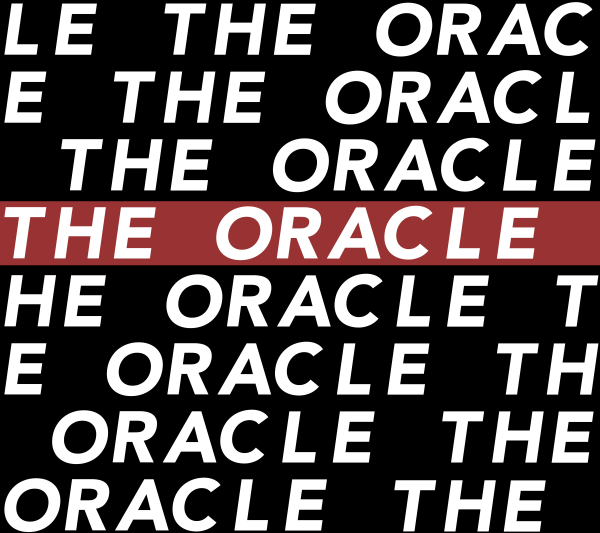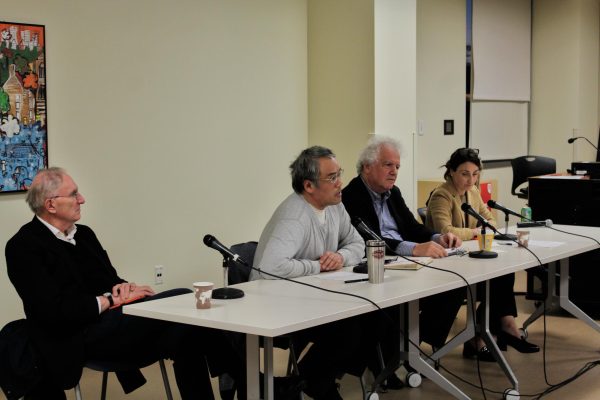Coping with depression through a religious lens
Hamline panel discusses how to cope with depression from a religious perspective.
Dr. Reverend Monica A. Coleman’s recent publication “Not Alone: Reflections on Faith and Depression” was the focus of the panel on depression in the Anderson Center on Sunday, April 6.
According to the United States Center for Disease Control and Prevention, one in ten adults report having suffered from depression. A recent panel in Anderson Center addressed depression in its relation to spirituality. Discussing this issue were author and Reverend Dr. Monica A. Coleman, Professors Rabbi Esther Adler and Reverend Julie Neraas, student and Buddhist at the University of Minnesota Caleb Easterly and Hamline psychologist Hussain Rajput.
The focus of the panel was centered around Coleman’s recent publication “Not Alone: Reflections on Faith and Depression.” Coleman is a scholar and an activist. She is an ordained Elder in the African Episcopal Church, and currently serves as both the associate professor of constructive theology and African American Religions and as the co-director of the center for process studies at Claremont School of Theology in southern California, in addition to as acting as an associate professor of religion at the Claremont Graduate University. Coleman is also an avid writer and blogger. She blogs about her struggle with depression and in 2014 published her book based on those blogs.
Ronnie Stimson is a sophomore and an intern at the Hamline Church. He helped to organize the panel in an effort to connect Hamline and the Church. He said that Coleman fell into the panel naturally, and he felt that her book would be a great focus for the event.
“Depression and the church were both things that some of us were familiar with. We saw this topic as one that both students and church members deal with,” Stimson said. “Depression is talked about, but not in a spiritual perspective.” Most of the panelists agreed.
Coleman mentioned how, in a lot of Christian groups, not being happy is a sign that something is wrong with you. But she feels that amidst cold weather climates, trudging through the snow, homework, studying, cramming for tests and the other stresses of college, being a student is a climate made for depression. She said she has heard the Christian mantra, “you’re too blessed to be stressed,” but doesn’t believe it. She said, “I felt nothing was spiritually wrong with me. I didn’t feel like I always needed to be happy, that God got me, it was just that nobody else did.”
Caleb Easterly, a panelist and a member of Common Ground Meditation Center in Minneapolis, has been working with depression and meditation for a number of years. He initiated a mindfulness and depression community group at Common Ground and is currently a student at the University of Minnesota. He said that it was suffering from depression that got him into spiritual practice. Now, he is a Buddhist.
Easterly’s mindfulness group at Common Ground uses the book “The Mindful Way Through Depression” to help deal with this issue. Easterly noted this about depression, “This sadness, fear, anxiety, and worry…is a part of life, but for people that have depression, the negative thoughts come whenever there is a negative experience. And that feeds more negative feelings and responses.”
Rabbi Esther Adler, associate Rabbi at Mount Zion Temple, and an associate chaplain at Hamline University, has served as a chaplain and a director on boards in a variety of locations in the Twin Cities. She has taught courses at Hamline, Yale and other colleges and universities around the U.S. She made the point that depression is an illness: if you break a leg no one judges you if you go and get a cast. “In our society,” Adler said, “if you have heart disease or diabetes you’re expected to go to the doctor and get treatment. If you have mental illness it is exactly the same. God isn’t punishing you for having this affliction. Depression is a disease that needs to get treated in any way that you can. And it’s harder to treat a mental illness than a broken leg.”
Julie Neraas is an ordained Presbyterian minister, a spiritual director and associate professor at Hamline University, where she has taught since 1991. For 22 years she taught in the graduate program and the past two years she has been working with undergraduates. She said, “Depression is fairly new as an open and talked about disease. When it comes to the mind we are still pioneers. We are in the Alaska of medicine.” She went on to say that depression is not a matter of trying harder and bunching up our muscles. In our culture, we push against the label of being a sick person. But that isn’t the case with mental health.
Also on the panel was Hussain Rajput, licensed psychologist, and director of counseling and health services at Hamline University. He received his Doctorate in Counseling and Student Personal Psychology from the University of Minnesota in 1999. He has served as an adjunct professor at St. Olaf College and St. Mary’s University. He said there are many different ways to think about and talk about depression. The terms are merely descriptive, and it might be helpful to be able to distinguish between sadness and severe depressive disorders. “Biological problems,” he said, “include self esteem issues, differences in cognitive issues—how we process information—and apathy when attempting to do common acts.”
Rachel Mills is a sophomore and a major in Biology and Social Justice. She has been reading Coleman’s book, a forty-day devotional on faith and depression. She came to the panel because of her own interests in learning about spirituality and mental health. She has been touched by depression in her own life and wanted to learn more about this unique intersection.
She said that the panel lived up to her expectations and she would recommend it to others. “Depression is stigmatized in our society and it’s important that people participate in forums like this to learn about the types of support in religious communities and on campus, in general. It touches so many lives that it’s important to learn how to respond and be a good ally to someone who has depression,” Mills said.
Coleman said her experiences with churches is that, “They’re so bad about this stuff. [Churches] are bad about a lot of stuff: sex, or blaming ourselves or God for the bad things that happen to us, and mental health.” She elaborated and noted how the only congregations that haven’t been bad about mental health are those where the pastors are mental therapists or psychologists—because those types of people are attuned to depression.
During the discussion portion of the panel one woman said that the hardest part of her depression was that her husband didn’t get it. “When you’re majorly depressed, doing something as simple as moving a cup from your left side to your right, is nearly impossible,” she said. “And if you have a loved one who doesn’t get it, it’s even more depressing.”
As for dealing with depression, Coleman said, “For me it’s accepting that [depression] is a part of who I am. And I like who I am, so I need to like this part about me too.”
Easterly agreed with Coleman. He said, “Spirituality and meditation, for me, is being there. It is about being present and showing up. Even if I don’t want to deal with [the depression].”
“Naming is empowering. If we can begin to name depression, we can begin to alleviate it,” Adler said.
Dick Peterson, an audience member, talked about having a son with manic depression, and being in hospitals in Atlanta, Chicago, Minneapolis and St. Paul—fourteen times in total. His biggest message was that there should be no personal shame for those dealing with depression, or even family, friends, or loved ones. He said that the problems of depression are not the fault of the person, but the chemistry of the brain. “There’s nothing wrong with asking for help,” Peterson said.
“The worst part about depression is the vast alienation. The sense that no one else knows what I’m going through. No one else knows me. No one else can possibly know what it’s like to feel this bad,” Coleman said. She went on to note that faith-based organizations can help people suffering from depression. “If you can pray for somebody that has had a cancer diagnosis and you can pray for someone who is going in for dialysis, then you can pray for someone who is wrestling with depression or anxiety.”
Adler said that part of healing depression can come from ritual, the sabbath, the wrapping up in a prayer shawl, etc. She said that in the Jewish faith, “A visit to a sick person can alleviate a sixtieth of their pain. Enough visits can alleviate it altogether.”
The message talked about the most was that of ‘walking with’ a depressed person. “One response to being with a depressed person is, don’t leave. Don’t get in their face so much that you cause damage, but stay with them because that relationship is valuable,” Adler said.
“Just be there,” Easterly said on the same subject.
“You can’t tell somebody to just “feel better,” but we don’t have to let them wallow in their despair either,” Adler said.
Mills said that reading Dr. Coleman’s books emphasized how faith can stigmatize depression, that if one is feeling depressed it can be interpreted that the individual’s faith isn’t strong enough. “I think that it’s important to get it out there that this is not true. Depression is an illness and it’s not a defect in your faith or spirituality,” Mills said.
Professor Neraas ended her part of the panel with a quote from the Dalai Lama, who was at Macalester College last month. He was asked what he would say to college-aged young adults. His answer was, “They need spiritual practices and disciplines like never before.”






